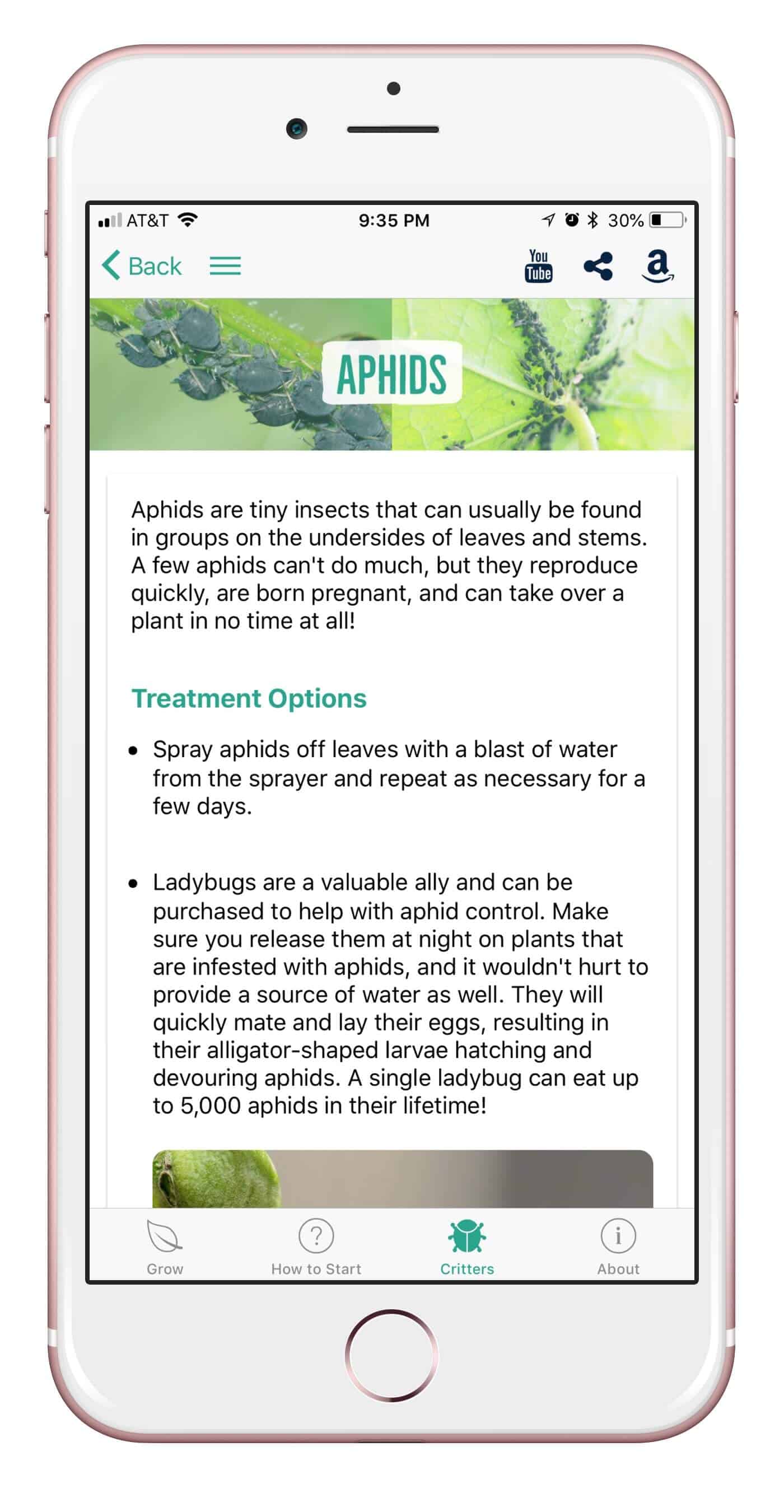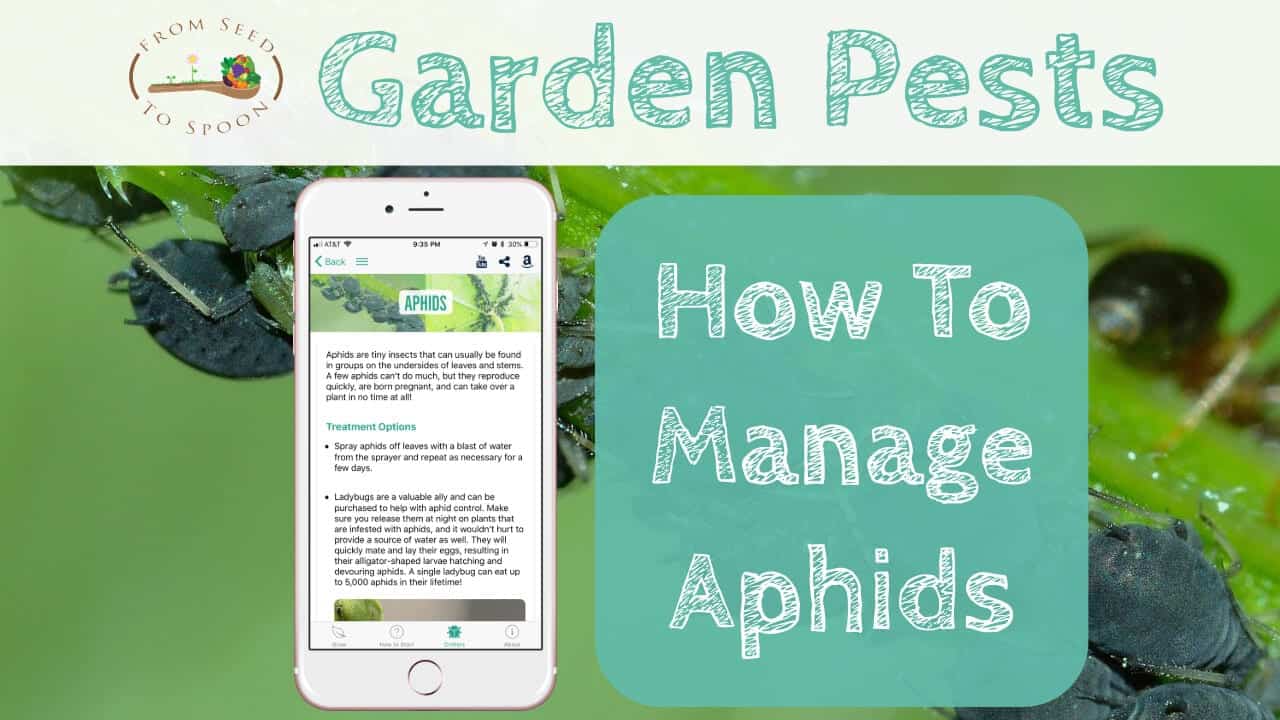Aphids are tiny insects that can usually be found in groups on the undersides of leaves and stems. A few aphids can’t do much, but they reproduce quickly, are born pregnant, and can take over a plant in no time at all!
Treatment Options:
- Spray aphids off leaves with a blast of water from the sprayer and repeat as necessary for a few days
- Ladybugs are valuable ally and can be purchased to help with aphid control. Make sure you release them at night on plants that are infested with aphids, and it wouldn’t hurt to provide a source of water as well. They will quickly mate and lay their eggs, resulting in alligator-shaped larvae hatching and devouring aphids. A single ladybug can eat up to 5,000 aphids in their lifetime!
- Buy Ladybugs on Amazon!
- Green lacewing larvae are voracious predators of many soft bodied insect pests, including several species of aphids, spider mites, thrips, whiteflies, leafhoppers, and others.
- Buy Green Lacewings on Amazon!
Aphids pretty much can attack any and all plants! Plants to especially watch:
- Squash, such as:
- Plants in the Brassicaceae family, such as:
- Peppers
- Basil
- Beans (Bush & Pole)
- Beets
- Berries, such as:
- Cantaloupe
- Chamomile
- Cilantro/Coriander
- Cucumber
- Dill
- Marigolds
- Nasturtiums
- New Zealand Spinach
- Okra
- Rosemary
- Sage
- Southern Peas (Black-eyed peas)
- Spinach
- Tomatoes (Bush & Vine)
Learn more about growing over 90 different foods, including how to manage various pests in our FREE iOS, Android, or new Universal Web App!


Carrie Spoonemore, co-founder of “From Seed to Spoon,” stands as a beacon of inspiration for gardeners and health enthusiasts alike. Her journey alongside her husband, Dale Spoonemore, in creating a platform that demystifies gardening and promotes a healthier lifestyle, has made a significant impact on individuals around the globe. Through the “From Seed to Spoon” app, Carrie has dedicated herself to empowering people to take control of their health and environment by growing their own food.
With a profound belief in the power of gardening to improve mental and physical health, Carrie’s contributions to the Seed to Spoon blog reflect her holistic approach to wellness. Her articles often focus on the nutritional benefits of homegrown fruits and vegetables, organic gardening practices, and the mental health benefits of spending time in nature. Carrie’s expertise in health science shines through in her detailed discussions on how specific plants can contribute to a balanced diet and overall well-being.
Carrie’s passion for gardening is deeply intertwined with her commitment to family and community wellness. She frequently shares personal stories of how gardening has brought her family closer together, offering practical tips for involving children in gardening activities and making it a fun, educational experience. Her writing encourages families to explore gardening as a means of spending quality time together while learning about nature and sustainability.
In addition to gardening advice, Carrie’s contributions to the blog include insights into the use of technology to enhance the gardening experience. She has played a crucial role in designing the “From Seed to Spoon” app to be user-friendly, ensuring that users of all ages and backgrounds can navigate the complexities of gardening with ease. Her vision for the app is not just as a gardening tool but as a vehicle for change, inspiring individuals to adopt a more sustainable lifestyle by growing their own food.
Carrie Spoonemore’s presence on the blog is marked by her compassionate approach to teaching and her unwavering belief in the transformative power of gardening. Her work continues to inspire a community of gardeners to pursue a healthier, more sustainable way of living, proving that with the right tools and knowledge, anyone can become a gardener and advocate for their health and the planet.







45 thoughts on “How to: Manage Aphids in Your Garden”
That sounds like those fuzzy little animals on Star Trek. They were born pregnant. What were those things?
Trebbles!
Tribbles?
HAHAHA! It sounds so creepy, doesn’t it?!?!
Yes! Yet what parasitic wasps do to them is even creepier!